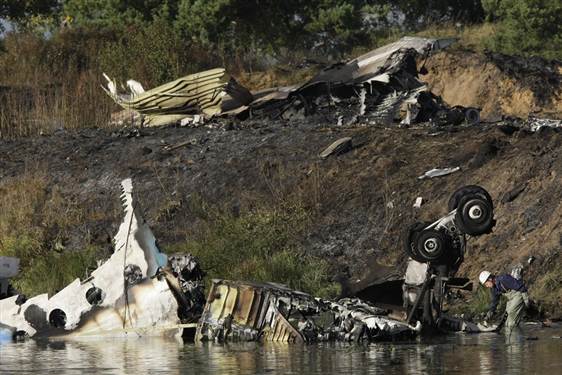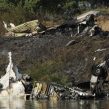
High Profile Disasters In Russia: Transport Minister Retains His Post
Publication: Eurasia Daily Monitor Volume: 8 Issue: 174
By:

This week, Russia’s long serving Transport Minister Igor Levitin was called to answer angry questions in the Duma after a series of tragic plane crashes and a riverboat sinking last July left hundreds of passengers and crew members dead. On September 7, a Yak-42 jet carrying the popular Yaroslavl Lokomotiv ice hockey team – one of the most prominent in the Russian-dominated Continental Hockey League – crashed during takeoff from Yaroslavl, killing 44 of the 45 on board (one crew member survived). The crash caused uproar in Russia, coming on the heels of other recent manmade disasters. Opposition parties in the Duma called for Levitin’s resignation, but the ruling United Russia announced it will squash any attempt to punish him (RIA Novosti, September 19). Levitin (59) who lacked any previous public administrative or political background was suddenly appointed as the transport minister by Vladimir Putin in February 2004 during his first presidential term.
Levitin told the Duma that Russian passenger aircraft are rusty while two thirds of civil airfields need urgent repairs and modernization. There are 332 civil airfields in active use and 38 percent, according to Levitin, have dirt runways, while most of the others were built more than 40 years ago. The average age of passenger aircraft in service is 21 years: 1,044 are Russian-built and 479 are imported. Since 1991, according to Levitin, the Russian aircraft-building industry managed to produce and deliver only 52 jets, though during communist rule it made hundreds annually. The average age of Russia’s 128 actively used cruise passenger riverboats is 45 years. Levitin announced the government will spend 160 billion rubles ($5.2 billion) until 2015 to modernize 70 civilian airfields (ITAR TASS, September 20).
The authorities have been blaming crews and greedy owners for the string of disasters. This week it was announced that a badly trained flight crew made critical mistakes that led to engine failure and the crash landing at Domodedovo airport of a Tu-154 jet bound for Makhachkala, Dagestan soon after takeoff on December 4, 2010. Of the 163 people on board, two died and 33 were seriously injured. The survivors were lucky: the jet missed the runway and broke up, but the fuel did not ignite (Interfax, September 20).
On June 21, an old Tu-134 jet crashed while landing in Petrozavodsk in Karelia, killing 47 of the 52 on board. This week, air control authorities announced that the crash resulted from the captain removing the second pilot and taking erroneous flight orders in bad visibility from a drunk and agitated navigator. The Tu-134 missed the runway and hit trees before crashing (Interfax, September 19). The investigation of the Yak-42 disaster in Yaroslavl is continuing, but it is possible it will be also blamed on the crew (Interfax, September 21).
Russians are flying in old planes that are often not equipped with modern safety equipment and are not always properly maintained. But even in good technical condition these old jets are seriously handicapped – their old Soviet-designed engines eat up fuel, which makes them terribly uncompetitive when oil prices are as high as today. Services are meager while tickets are much more expensive than in Europe or the US, but small and medium-size air companies are all the time hovering on the brink of insolvency and collapse. Administrators and flight crews are under constant pressure to economize on everything: on crew training and service conditions and especially on fuel to reduce operational costs, so they shun aborting risky takeoffs and landings. Constant stress may lead to pilots making fatally wrong judgments.
This collapse was directly promoted by Putin’s policies of supporting Russia’s ailing aircraft industry by protective 20 percent import tariffs on foreign-made aircraft plus 18 percent VAT, which allows the import only of cheap and aging second-hand aircraft. Of course, consistent with corrupt Russian tradition, the biggest state-owned Aeroflot air company was granted a special reprieve to import new Western aircraft duty free.
Recently the government began to lift some aircraft import tariffs and after the disaster in Yaroslavl President Dmitry Medvedev announced: “Human life must be more precious than the special interests of Russian producers” (Interfax, September 8). But it is not clear, whether the import tariffs will be lowered, since protectionism has been a constant feature of Putin’s economic policies. Duma elections will be held in December and the presidential elections next March, consequently lowering the tariffs would surely be portrayed by special interest groups as unpatriotic.
The removal of restrictive import tariffs and taxes in any case will not immediately resolve the disastrous transport infrastructure crisis in Russia or improve the professional capabilities of air controllers and pilots. A better solution would be: not only squashing tariffs and taxation on new modern aircraft, but also allowing European air companies to fly internal Russian routes. Competition would increase the quality of service and reduce prices.
For Putin, constantly worried by presumed Western intrusions, such liberalization seems impossible, no matter how many more people die in manmade transport disasters. Medvedev’s initial emotional response about putting the lives of citizens before the interests of the aviation industry was quickly watered down. The transport ministry announced that Yak-42 and Tu-134 jets will continue to fly, but efforts will be made to reequip them with modern safety features. The Kremlin announced that by next February the government must devise a special scheme to subsidize the purchase of modern aircraft “disregarding national origin of production” while subsidizing local and regional air transportation (Interfax, September 12).
Federal budget subsidies allow corrupt officials to line their pockets whereas deregulation does not, while dead pilots are blamed for the disasters. The chief of Rosaviatsia state agency Alexander Heradyko told the Duma, “of the 15 civil aircraft disasters this summer – eight involving helicopters and seven with fixed wing aircraft – 11 happened because of crew error.” Heradyko added that all of the pilots involved were highly experienced, “which means there were errors in their training” (ITAR-TASS, September 20).




